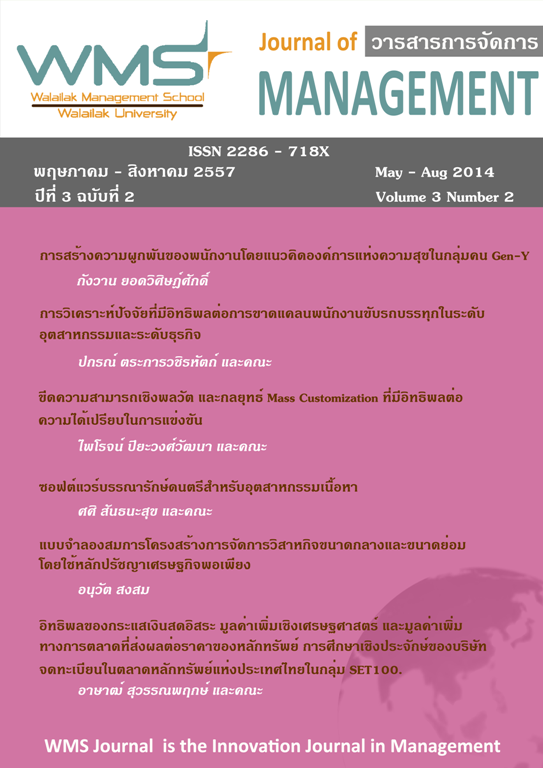Structural Equation Model of Small and Medium Enterprise Management Based on the Philosophy of Sufficiency Economy
Main Article Content
Abstract
The purpose of this research was to develop a structural equation model of small and medium enterprises (SMEs) management based on the philosophy of sufficiency economy. The sample consisted of 504 entrepreneurs in Songkhla province by multi-stage sampling. The research was analyzed by 5 latent variables: knowledge, morality, moderation, reasonableness and self-immunity; with 25 observed variables. The questionnaires were used as a research instrument which measured on five-point Likert scales. The major findings show that the structural equation model was valid and fit to the empirical data
(c2=411.28, df=212, c2/df=1.94, CFI=0.96, SRMR=0.054, RMSEA=0.049). The model accounted for 0.78-0.89 of construct reliability, and 0.62-0.76 of the average variance extracted. In hypothesis testing, it was found that the knowledge factor exhibited direct influence on the morality, moderation, reasonableness, and self-immunity of the SMEs. The morality factor exhibited direct influence on the moderation and reasonableness of the SMEs at significant level .05Article Details
References
ณดา จันทร์สม. 2555. ธุรกิจกับปรัชญาของเศรษฐกิจพอเพียง. กรุงเทพฯ: ศูนย์ศึกษาเศรษฐกิจพอเพียง สถาบันบัณฑิตพัฒนบริหารศาสตร์.
ธานินทร์ ศิลป์จารุ. 2555. แบบจำลองสมการโครงสร้างแนวทางการบริหารธุรกิจค้าปลีกดั้งเดิมของไทยให้ดำรงอยู่ได้อย่างยั่งยืนด้วยทฤษฎีเศรษฐกิจพอเพียง.วิทยานิพนธ์บริหารธุรกิจดุษฎีบัณฑิต มหาวิทยาลัยรามคำแหง.
สถาบันไทยพัฒน์. 2554. เศรษฐกิจพอเพียงกับการดำเนินธุรกิจ. พิมพ์ครั้งที่ 2. กรุงเทพฯ: โทเทิ่ล แอ็คเช็ส คอมมูนิเคชั่น.
สำนักงานส่งเสริมวิสาหกิจขนาดกลางและขนาดย่อม. 2556. รายงานสถานการณ์
วิสาหกิจขนาดกลางและขนาดย่อม ปี 2556. สืบค้น 22 มีนาคม 2557, จาก
http://www.sme.go.th/Lists/EditorInput/DispF.aspx?List=15dca7fb-bf2e-464e-97e5-440321040570&ID=2095.
Geisler, E., & Wickramasinghe, N. 2009.Principles of knowledge management: Theory, practice, and cases. New York: M. E. Sharpe.
Hair, J. F., Black, W. C., Babin, B. J., & Anderson, R. E. 2010. Multivariate data analysis: A global perspective (7th ed.). Upper Saddle River, NJ: Prentice Hall.
Hussain, N. J. Z. 2004. The return of moral fictionalism. Philosophical Perspectives.18(1), 149-188.
Jackson, D. L. 2003. Revisiting sample size and number of parameter estimates: Some support for the N: q hypothesis. Structural Equation Modeling. 10(1), 128-141.
Kalderon, M. E. 2005. Moral fictionalism. New York: Oxford University Press.
Mills, L. P. 2011. The relationship between moral reasoning and knowledge management processing. Ph.D. Dissertation, Walden
University, USA.
Pavlova, M. 2009. Technology and vocational education for sustainable development. Australia: Springer.
Statsky, W. P. 2012. Essentials of torts (3nd ed.). New York: Delmar.
Wheelen, T. L. 2011. Concepts in strategies management and business policy (13th ed.). Upper Saddle River, NJ:
Prentice Hall.


